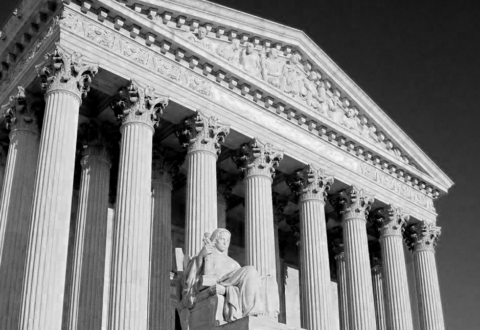Due Process and the Courts

New TRAC Reports Show a Staggering Immigration Caseload and an Unrelated Drop in Federal Prosecutions
The Transactional Records Clearinghouse (TRAC) reports that the backlog in U.S. Immigration Courts reached an all-time high of 228,421 cases in the first months of fiscal year (FY) 2010. However, the Executive Office for Immigration Review (EOIR) is taking important steps to alleviate this backlog by attempting to hire more immigration judges. The number of cases awaiting a hearing is up 23% from the end of FY 2008, and up 82% from 10 years ago. This has led to the average pending time for each individual case at the EOIR to rise to an all time high of 439 days. Read More

New ABA Study Documents Serious System-Wide Problems in the Removal Process
For over a year, the American Bar Association’s Commission on Immigration and the law firm of Arnold & Porter LLP engaged in a comprehensive review of the current removal process. The law firm poured over hundreds of articles, reports, legislative materials, and other documents, and interviewed scores of participants in the system, including lawyers, judges, advocacy groups, and academics. This study led them to conclude what many immigrants, their families, and immigration lawyers and advocates already knew and what many others suspected: the removal system is severely flawed and fails to afford fair process to all noncitizens facing deportation from the United States. The study details many of the deficiencies in the current system and makes a strong case for systemic reform. Read More

Supreme Court Protects Immigrants’ Access to Court Review
Yesterday, the U.S. Supreme Court issued a decision ensuring that immigrants facing deportation have fair process in the review of their cases. The Court ruled that individuals who seek to reopen their deportation orders have the right to appeal to the federal courts if the immigration court refuses to reopen the case. The Court's decision protects immigrants' access to federal court review and affirms the role of the courts in our system of checks and balances on government power. Read More

Supreme Court to Decide Whether Long Term Resident Can Be Deported Based on Possession of Anxiety Drug
Last week, the U.S. Supreme Court announced it would decide whether a permanent resident who was convicted of a second drug possession offense can be deported without an opportunity to make a case for why he should be allowed to remain in the United States. This case, which will resolve a split in the federal courts, will affect hundreds of immigrants who face deportation each year. It also serves as an unfortunate reminder that we still struggle with the adverse effects of the overbroad and unforgiving immigration laws passed by Congress in 1996. Read More

Shenandoah is a Cautionary Tale for How to Debate Immigration Reform
This week a police chief and two of his officers were charged with obstruction of justice in connection with their investigation of the beating death of Luis Ramirez, a 25-year-old undocumented Mexican immigrant, in Shenandoah, PA, last year. The two teenagers acquitted of his murder were also indicted on federal hate crime charges. While some measure of justice may eventually be served in the Ramirez case, this tragedy should serve as a cautionary tale as we move into 2010 and gear up for a new round of immigration reform debates. Policy makers and the media must understand that when the debate devolves from reasoned, fact-based discussions into fear and hate-mongering the consequences can be dire. Read More

ICE Transferring Detainees Impedes Their Access to Counsel and Limits Their Right to Present a Defense to Deportation
Two recent reports draw attention to yet another defect in the government’s problem-ridden detention system: ICE’s practice of regularly transferring immigration detainees from one jail to another, often far from where ICE initially arrested them. Transfers have a devastating effect on a person’s ability to retain counsel and maintain an attorney-client relationship; present a defense to deportation; and obtain release from detention. The government should take immediate steps to eliminate these effects and ensure that people who are detained are afforded a fair hearing. Read More

The Right to a Remedy for Ineffective Assistance of Counsel
Immigrants reasonably rely on their lawyers’ advice, and they expect their lawyers to be knowledgeable about immigration law and procedure. They count on their lawyers to be their voice in immigration court when facing removal and help ensure that they have a meaningful opportunity to be heard. In the great majority of cases, lawyers competently represent their clients’ interests. But what happens in those occasional situations where the immigrant is defrauded by an unscrupulous lawyer, or an otherwise competent lawyer makes an inadvertent mistake that results in the person being ordered removed from the United States? Certainly, a person should not be deprived of the opportunity to present a defense in removal proceedings because of his or her lawyer’s conduct. Read More

New Report Shines Light on Detainee Rights Violations in Minnesota
Over the summer, three graduate students at the University of Minnesota’s Humphrey Institute interviewed immigration attorneys and public defenders to document their experiences working with detained immigrants. The result—a heartbreaking account of detainees locked away, without access to counsel or family, in a system where rights and the most minimal detention standards are routinely violated. Read More

Does U.S. Attorney Nomination Send a Mixed Signal on Immigration?
While the Obama administration has spent the past year discussing its plans to reform our broken immigration system, it is the day to day actions that, at times, draw a stark contrast to the hope and promise of a new strategy on U.S. immigration. The nomination of Stephanie Rose to lead the U.S. Attorney’s Office for the Northern District of Iowa seems like a mixed signal to immigration reformers. Rose’s 12-year career in the U.S. Attorney’s office was most notably marked by her role as lead prosecutor on the largest (and most controversial) immigration worksite enforcement in U.S. history. Read More

Supreme Court Hears Case about Immigrants’ Access to Federal Court Review
Last week, the Supreme Court heard arguments in a case that involves an important safeguard for immigrants facing removal from the United States—access to federal court review. The case, Kucana v. Holder, was brought by an asylum seeker from Albania. Mr. Kucana is seeking court review of a government decision depriving him of the opportunity to present his asylum claim. The Seventh Circuit Court of Appeals (based in Chicago) refused to review the government’s decision. Instead, the Seventh Circuit found that in his case, the government has unfettered discretion over a potentially life and death decision. The Supreme Court now is considering whether the Seventh Circuit was right. Read More
Make a contribution
Make a direct impact on the lives of immigrants.
